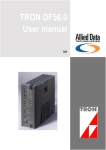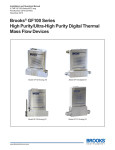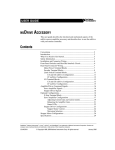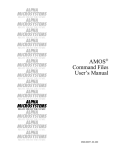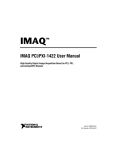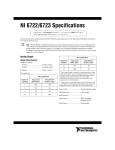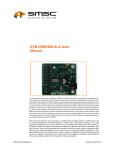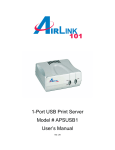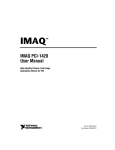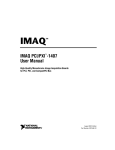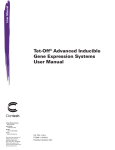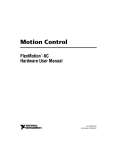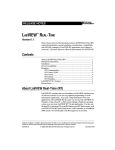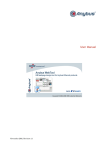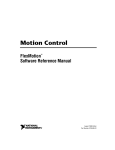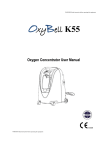Download UMI-7764
Transcript
USER GUIDE UNIVERSAL MOTION INTERFACE (UMI) ACCESSORY This user guide describes how to use the UMI-7764, UMI-4A, UMI-Flex6, and UMI-Flex4 accessories. Contents Introduction ............................................................................................. 2 What You Need to Get Started ............................................................... 2 UMI-7764................................................................................................ 4 Motion I/O Terminal Block ............................................................. 5 Amplifier/Driver Terminal Block .................................................... 5 Encoder Terminal Block .................................................................. 6 Limit Switch Terminal Block .......................................................... 8 Analog Input Terminal Block .......................................................... 9 Breakpoint Output/Trigger Input Terminal Block........................... 9 Shutdown/Inhibit All Terminal Block ............................................. 10 Power Input Terminal Block............................................................ 10 UMI-7764 Specifications........................................................................ 11 UMI-4A................................................................................................... 13 Amplifier/Driver Terminal Block .................................................... 13 Encoder Terminal Block .................................................................. 15 Limit Switch Terminal Block .......................................................... 16 Digital I/O Terminal Blocks ............................................................ 17 Power Input Terminal Block............................................................ 18 UMI-4A Specifications ........................................................................... 19 UMI-Flex6 .............................................................................................. 21 Amplifier/Driver Terminal Block .................................................... 21 Encoder Terminal Block .................................................................. 22 Limit Switch Terminal Block .......................................................... 24 Analog Input Terminal Blocks ........................................................ 25 Breakpoint Output Terminal Block ................................................. 26 Power Input Terminal Block............................................................ 26 UMI-Flex6 Specifications....................................................................... 27 UMI-Flex4 .............................................................................................. 28 Amplifier/Driver Terminal Block .................................................... 28 Encoder Terminal Block .................................................................. 30 Limit Switch Terminal Block .......................................................... 32 Analog Input Terminal Block .......................................................... 32 Breakpoint Output Terminal Block ................................................. 33 Power Input Terminal Block............................................................ 33 UMI-Flex4 Specifications....................................................................... 34 FlexMotion ™ and ValueMotion ™ are trademarks of National Instruments Corporation. Product and company names mentioned herein are trademarks or trade names of their respective companies. 321941B-01 © Copyright 1998, 1999 National Instruments Corp. All rights reserved. August 1999 Introduction The UMI products are connectivity accessories you can use with your motion control boards for up to four or six axes of simultaneous or independent control. Ideally suited to industrial and laboratory applications, UMI accessories connect power supplies, servo amplifiers or stepper drivers, motors, encoders, and limit switches to National Instruments plug-in motion control boards. A UMI accessory simplifies field wiring with separate encoder, limit switch, and amplifier/driver terminal blocks per axis. All terminal blocks are industry standard and do not require any special tools for wire installation. The UMI accessory connects to the motion controller via a single interface cable. The UMI accessory has a host bus monitor power interlock that automatically disables the amplifiers if the host computer is shut down or the interface cable is disconnected. The UMI-4A and UMI-Flex4 come with an integrated DIN-rail mounting base. The UMI-Flex6 is encased in metal and comes with attached rubber feet for desktop use; a DIN-rail mounting kit is available separately. The UMI-7764 is encased in a metal box with a hinged lid and comes with attached rubber feet for desktop use. Note Throughout this document, overlined text indicates that a signal is active-low. What You Need to Get Started To set up and use your UMI accessory, you will need the following items: ❑ One of the following UMI accessories: – UMI-7764 – UMI-4A – UMI-Flex6 – UMI-Flex4 ❑ Universal Motion Interface (UMI) Accessory User Guide UMI Accessory User Guide 2 www.natinst.com ❑ One of the following National Instruments cables: UMI Accessory Cable Motion Controller UMI-7764 SH68-C68-S All 7344 controllers, PCI-7324, PCI-7314 UMI-7764 SH68-68-S PXI-7324, PXI-7314 UMI-4A SH50-50, NB1 50-pin ValueMotion controllers UMI-Flex6, UMI-Flex4 SH-Flex-100 100-pin FlexMotion controllers ❑ +5 V power supply ❑ (Optional) Auxiliary power supply (UMI-4A only) ❑ (Optional) ISO power supply (UMI-Flex4 and UMI-Flex6 only) Detailed specifications for each of the UMI accessories are in the Specifications section for each device. © National Instruments Corporation 3 UMI Accessory User Guide UMI-7764 This section describes the UMI-7764 terminal block. Refer to Figure 1 to help you locate the different parts of the UMI-7764 accessory. 10 9 8 7 11 6 1 2 1 2 3 4 Axis 1 Motion I/O Terminal Block Axis 3 Motion I/O Terminal Block Axis 2 Motion I/O Terminal Block Axis 4 Motion I/O Terminal Block 5 6 7 8 5 3 Power Input Terminal Block 9 Shutdown/Inhibit All Terminal Block 10 Inhibit Output Polarity Switch (S1) 11 Inhibit Input Polarity Switch (S2) 4 Analog Input Terminal Block 68-Pin Motion I/O Connector Breakpoint/Trigger Terminal Block Figure 1. UMI-7764 Parts Locator Diagram UMI Accessory User Guide — UMI-7764 4 www.natinst.com Motion I/O Terminal Block Each axis connected to the UMI-7764 has a motion I/O terminal block to which the following signals are wired: • Amplifier/driver connections • Encoder connections • Limit switch connections • Distributed power connections Figure 2 shows which portions of the terminal block are used for different functionality. Forward Limit Home Input Reverse Limit Inhibit Input Digital Ground Analog Output Analog Output Ground Inhibit Output Step (CW) Dir (CCW) +5 V (Output) Digital Ground Encoder Phase A Encoder Phase A Encoder Phase B Encoder Phase B Encoder Index Encoder Index Limit Switch Terminals Amplifier/Driver Terminals Distributed Power Encoder Terminals Figure 2. UMI-7764 Motion I/O Terminal Block Amplifier/Driver Terminal Block Each UMI-7764 axis motion I/O terminal block has five terminals for amplifier/driver connections. Refer to Figures 1 and 2 to locate the amplifier/driver terminals on your UMI-7764 accessory. Figure 3 shows the UMI-7764 amplifier/driver terminal block pin assignment for the servo/stepper axes. © National Instruments Corporation 5 UMI Accessory User Guide — UMI-7764 Analog Output Analog Output Ground Inhibit Output Step (CW) Dir (CCW) Figure 3. UMI-7764 Axes Amplifier/Driver Terminal Block Pin Assignments The Analog Output signals are used as command outputs to a servo amplifier or as general-purpose voltage outputs. The Step and Dir signals are used as command outputs to a stepper driver. The Inhibit Output signals are used to disable the amplifier/driver for that axis. The UMI combines the host bus interlock circuit, the Inhibit All signal, the per axis Inhibit Input signals, and the per axis controller Inhibit Output to create the per axis Inhibit Output signal. The host bus interlock monitors the +5 V pin from the motion controller to verify that the controller is powered and properly connected to the UMI. If the host bus interlock detects a problem, if the Inhibit All signal is asserted, or if the Inhibit Input signal or the controller Inhibit Output signal for that axis is asserted, the Inhibit Output from the UMI-7764 for that axis is asserted. You can configure the axis Inhibit Out signal as active-low or active-high output using switch S1. Setting S1 to the bottom configures the signal as active-low; setting S1 to the top configures the signal as active-high. Note You must configure the controller’s Inhibit Output signals as active-low for proper operation of the inhibit circuitry. Encoder Terminal Block Each UMI-7764 axis motion I/O terminal block has six terminals for incremental encoder connections. The UMI-7764 accepts either single-ended TTL or differential line driver inputs. You can connect open-collector encoders to the UMI-7764 accessory by installing a 2.2 kΩ pull-up resistor to +5 V. Note Encoders with line driver outputs are recommended for all applications and must be used if the encoder cable length is greater than 10 feet. UMI Accessory User Guide — UMI-7764 6 www.natinst.com Power for the encoders is internally routed from the power input terminal block and is available on the +5 V terminal on each axis motion I/O terminal block. You must supply a +5 V source to the power input terminal block for proper operation. Refer to Figures 1 and 2 to help you locate the encoder terminals on your UMI-7764 accessory. Figure 4 shows the wiring for a differential encoder. Note The dotted loop indicates a shielded cable. Shield1 Phase A Phase A Phase B Phase B Index Index 1Connect to Digital Ground Figure 4. Differential Encoder Wiring Figure 5 shows the wiring for the single-ended encoder. Shield1 Phase A Phase B Index 1Connect to Digital Ground Figure 5. Single-Ended Encoder Wiring The UMI-7764 accessory allows for differential inputs for Phase A, Phase B, and Index signals. You can easily accommodate encoders with phase relationships different from Figure 6 by swapping the signals as required by the specific application. The Index pulse must occur when both Phase A and Phase B signals are logic low as shown in Figure 6. Servo and closed-loop stepper applications require encoder feedback and consistent directional polarity between the motor and encoder for stable operation. The UMI-7764 uses the following standards for motor direction: • Positive = forward = Clockwise (CW) facing motor shaft • Negative = reverse = Counter-clockwise (CCW) facing motor shaft © National Instruments Corporation 7 UMI Accessory User Guide — UMI-7764 Phase A Phase B Index Figure 6. Encoder Signal Phasing—CW Rotation The encoder inputs are filtered by both analog and digital noise filters. You must use cables with twisted pairs and an overall shield for improved noise immunity. When connecting the encoder to the UMI-7764, you should use at least 24-AWG wire. Using an unshielded cable allows noise to corrupt the encoder signals, which results in lost counts, reduced accuracy, and other erroneous encoder and controller operations. Caution Limit Switch Terminal Block Each UMI-7764 axis motion I/O terminal block has five terminals for Forward and Reverse Limit and Home Input switch connections. Refer to Figures 1 and 2 to help you locate the limit switch terminals on your UMI-7764 accessory. See Figure 7 for the UMI-7764 limit switch terminal block pinout. Forward Limit Home Input Reverse Limit Inhibit Input Digital Ground Figure 7. UMI-7764 Limit Switch Terminal Block Pin Assignment You can configure the axis Inhibit Input signals as active-low or active-high inputs using switch S2. Setting S2 to the bottom configures the signal as active-low; setting S2 to the top configures the signal as active-high. The Inhibit Input signals include a 3.3 kΩ pull-up resistor on their inputs. UMI Accessory User Guide — UMI-7764 8 www.natinst.com Analog Input Terminal Block For analog input wiring, the UMI-7764 has a 6-position terminal block, which provides access to the four analog input channels on your motion controller. Refer to Figure 1 to help you locate the analog input terminal block on your UMI-7764 accessory. See Figure 8 for analog input terminal block pinout information. Analog Input Ground Analog Reference (Output) Analog Input 4 Analog Input 3 Analog Input 2 Analog Input 1 Figure 8. UMI-7764 Analog Input Terminal Block Pin Assignments Breakpoint Output/Trigger Input Terminal Block For breakpoint output and trigger input wiring, the UMI-7764 has a 10-position terminal block. This terminal block provides access to the four breakpoint outputs and the four trigger inputs. Refer to Figure 1 to help you locate the breakpoint output/trigger input terminal block on your UMI-7764 accessory. See Figure 9 for more information on breakpoint output and trigger input wiring. Breakpoint 4 Breakpoint 3 Breakpoint 2 Breakpoint 1 Digital Ground +5 V (Output) Trigger 4 Trigger 3 Trigger 2 Trigger 1 Figure 9. UMI-7764 Breakpoint/Trigger Terminal Block Pin Assignments © National Instruments Corporation 9 UMI Accessory User Guide — UMI-7764 Shutdown/Inhibit All Terminal Block The UMI accessory has a 4-position terminal block for shutdown and inhibit all wiring. Refer to Figure 1 to help you locate the shutdown/inhibit all terminal block on your UMI-7764 accessory. See Figure 10 for more information on shutdown/inhibit all wiring. Digital Ground NC Shutdown Inhibit All Figure 10. Shutdown/Inhibit All Terminal Block Pin Assignments The Inhibit All signal acts as a global inhibit, and, when asserted, activates the Inhibit Outputs. The Inhibit All signal includes a 3.3 kΩ pull-up resistor on its input. The Shutdown signal is passed through to the motion controller and is typically used to disable the controller. Power Input Terminal Block The UMI-7764 has a 2-position terminal block for wiring power to the unit. Refer to Figure 1 to help you locate the power input terminal block on your UMI-7764 accessory. Figure 11 shows the 2-position terminal block pinout. +5 V Digital Ground Figure 11. 2-Position Power Input Terminal Block Pin Assignment Note To properly operate your UMI-7764 accessory, you must supply a +5 V source to the power input terminal block. Note The +5 V power is redistributed to other terminal blocks as an output power source. UMI Accessory User Guide — UMI-7764 10 www.natinst.com UMI-7764 Specifications The following specifications apply only to the UMI-7764 accessory. To obtain a system specification, you must account for your motion controller. Please refer to your controller specifications to determine overall system specifications. Some signals have compatibility defined as signal pass-through. This means the UMI-7764 may have passive filtering on these signals but will not affect the voltage range or current handling capability. Consult your motion controller specifications to determine the allowable voltage range and logic level compatibility of the signal. These specifications are typical at 25 °C unless otherwise specified. Refer to your motion controller user manual for detailed specifications on encoder inputs, limit and home switch inputs, breakpoint outputs, trigger inputs, and analog inputs. Encoder Interface (Each Axis) Inputs...................................................... Quadrature, incremental Differential input threshold .................... ±0.3 V (typical) Single-ended input threshold ................. TTL/CMOS Voltage range ......................................... 0 to 5 VDC Noise filter (RC time constant) .............. 100 ns Max quadrature frequency ..................... 1 MHz Limit and Home Switch Inputs (Each Axis) Noise filter (RC time constant) .............. 10 µs Compatibility ......................................... Signal pass-through Trigger Inputs Noise filter (RC time constant) .............. 100 ns Compatibility ......................................... Signal pass-through © National Instruments Corporation 11 UMI Accessory User Guide — UMI-7764 Specifications Inhibit and Inhibit All Inputs Voltage range..........................................0 to 12 VDC Input voltage threshold ...........................TTL/CMOS Input pull-up resistor ..............................3.3 kΩ Compatibility ..........................................Signal pass-through Analog Inputs Noise filter (RC time constant)...............10 µs Compatibility ..........................................Signal pass-through Axis Inhibit Out Voltage range..........................................0 to 5 VDC Output low voltage .................................0.5 V at 16 mA Output high voltage ................................2.4 V at 3.2 mA Operating Environment Temperature............................................0 to 55 °C Storage temperature ................................–20 to 70 °C Relative humidity ...................................10 to 90% (noncondensing) Power Requirements +5 VDC...................................................0.2 amps + user-defined encoder and limit power Host Bus Voltage Interlock Voltage....................................................5 VDC ± 5% Physical Dimensions .............................................19.5 by 15.2 by 4.5 cm (7.7 by 6.0 by 1.8 in.) UMI Accessory User Guide — UMI-7764 Specifications 12 www.natinst.com UMI-4A This section describes the UMI-4A terminal block. Refer to Figure 12 to help you locate the different parts of the UMI-4A accessory. 1 15 2 5 6 3 7 8 11 12 4 14 17 13 20 Amplifier Connectors 1 Axis 1 (J13) 2 Axis 2 (J14) 3 Axis 3 (J15) 4 Axis 4 (J16) Encoder Connectors 5 Axis 1 (J2) 6 Axis 2 (J4) 7 Axis 3 (J6) 8 Axis 4 (J8) 9 19 Limits Connectors 9 Axis 1 (J3) 10 Axis 2 (J5) 11 Axis 3 (J7) 12 Axis 4 (J9) 10 18 Other Connectors 13 I/O Bits 1–4 (J10) I/O Bits 5–8 (J11) 14 Opto 22 Compatible (J19) 15 Power (J18) 16 Miscellaneous 16 ValueMotion Controller (J1) 17 Jumpers (Axes 1–4) 18 Assembly Number 19 Serial Number 20 Reserved—Do not remove Figure 12. UMI-4A Parts Locator Diagram Amplifier/Driver Terminal Block For amplifier/driver wiring, each UMI-4A axis has a separate 6-position terminal block. Refer to Figure 12 to help you locate the amplifier/driver terminal block on your UMI-4A accessory. Figure 13 shows the terminal block pin assignment for the UMI-4A amplifier/driver used with a servo board. Analog Output Analog Output Ground +5 V (Output) Digital Ground System Inhibit I/O Bit (Axis #) 1 2 3 4 5 6 Figure 13. UMI-4A Amplifier/Driver with Servo Terminal Block Pin Assignment © National Instruments Corporation 13 UMI Accessory User Guide — UMI-4A The analog output signals are used as command outputs to a servo amplifier. The System Inhibit output signals are used to disable all of the amplifiers. The UMI accessory combines the host bus interlock circuit and the Enable Input signals to create the global System Inhibit signals. The host bus interlock monitors the +5 V pin from the motion controller to verify that the controller is powered and properly connected to the UMI. If the host bus interlock detects a problem, or if both Enable Input signals are deasserted, the System Inhibit signals are asserted. Figure 14 shows the UMI-4A amplifier/driver terminal block pin assignment used with a stepper board. Step (CW) Dir (CCW) +5 V (Output) Digital Ground Inhibit Output I/O Bit (Axis #) 1 2 3 4 5 6 Figure 14. UMI-4A Amplifier/Driver with Stepper Terminal Block Pin Assignment The Step and Dir signals are used as command outputs to a stepper driver. The Inhibit Output signals are used to disable the driver for that axis. The UMI accessory combines the host bus interlock circuit, the Enable Input signals, and the per axis controller Inhibit Output to create the per axis Inhibit Output signal. If the voltage drops to the host bus interlock circuit, if both Enable Inputs are deasserted, or if the controller Inhibit Output for that axis is asserted, the Inhibit Output signal for that axis is asserted. To configure your UMI-4A accessory for servo, move all four jumpers to the right. To configure your accessory for stepper, move all four jumpers to the left. See Figure 15 for more information on configuring your UMI-4A jumpers. Refer to Figure 12 to help you locate the jumpers on your UMI-4A accessory. Servo Stepper Figure 15. UMI-4A Jumper Configuration UMI Accessory User Guide — UMI-4A 14 www.natinst.com Encoder Terminal Block For incremental encoder connections, each UMI-4A axis has a separate 8-position terminal block. UMI-4A accepts either single-ended TTL or differential line driver inputs. You can connect open-collector encoders to the UMI-4A accessory by installing a 2.2 kΩ pull-up resistor to +5 V. Note Encoders with line driver outputs are recommended for all applications and must be used if the encoder cable length is greater than 10 feet. Power for the encoders is internally routed from the power input terminal block and is available on pin 7 (+5 V). You must supply a +5 V source to the power input terminal block for proper operation. Refer to Figure 12 to help you locate the encoder terminal blocks on your UMI-4A accessory. Figure 16 shows the wiring for the differential encoder. Note The dotted loop indicates a shielded cable. Phase A Phase A Phase B Phase B Index Index +5 V (Output) Digital Ground 1 2 3 4 5 6 7 8 Shield Figure 16. Differential Encoder Wiring Figure 17 shows the wiring for the single-ended encoder. Phase A 1 2 3 4 5 6 7 8 Phase B Index +5 V (Output) Digital Ground Shield Figure 17. Single-Ended Encoder Wiring © National Instruments Corporation 15 UMI Accessory User Guide — UMI-4A The UMI-4A accessory allows for differential inputs for Phase A, Phase B, and Index signals. You can easily accommodate encoders with phase relationships different from Figure 18 by swapping the signals as required by the specific application. The Index pulse must occur when both Phase A and Phase B signals are logic low as shown in Figure 7. Servo and closed-loop stepper applications require encoder feedback and consistent directional polarity between the motor and encoder for stable operation. The UMI-4A uses the following standards for motor direction: • Positive = forward = Clockwise (CW) facing motor shaft • Negative = reverse = Counter-clockwise (CCW) facing motor shaft Phase A Phase B Index Figure 18. Encoder Signal Phasing—CW Rotation The encoder inputs are filtered by both analog and digital noise filters. You must use cables with twisted pairs and an overall shield for improved noise immunity. When connecting the encoder to the UMI-4A, you should use at least 24-AWG wire. Using an unshielded cable allows noise to corrupt the encoder signals, which results in lost counts, reduced accuracy, and other erroneous encoder and controller operations. Caution Limit Switch Terminal Block For forward and reverse limit and home switch connections, each UMI-4A has a separate 6-position terminal block per axis. All limit and home switch inputs are filtered on the UMI-4A to enhance noise immunity. The UMI-4A supports active and passive limit switches. You can use auxiliary VDC on pin 4 to power active, open-collector limit switches. To use the auxiliary VDC you must supply a voltage to the auxiliary VDC input (pin 2 of the power input terminal block). Refer to Figure 12 to help you locate the limit switch terminal block on your UMI-4A accessory. Figure 19 shows an example of a passive limit switch terminal block pinout. UMI Accessory User Guide — UMI-4A 16 www.natinst.com Forward Limit Home Switch Reverse Limit Aux. VDC +5 V (Output) Digital Ground 1 2 3 4 5 6 Figure 19. UMI-4A Limit Switch Terminal Block Pin Assignment (Passive Limit Switch Connection Example) Digital I/O Terminal Blocks The UMI-4A has two I/O connectors: a 34-pin male box header (J19), which is compatible with standard Opto 22 I/O racks, and two 6-pin removable screw terminal blocks (J10 and J11) for all other I/O configurations. You can use both I/O configurations separately or in parallel. Pin 5 of each terminal block (J10 and J11) is an Enable Input connection. This connection controls a system enable–system inhibit function. If your configuration uses the inhibit output signal available on each per-axis driver/amplifier terminal block, the enable input on J10 or J11 must be connected to the common (ground) signal to enable the driver/amplifier. Note You do not need to duplicate the switch on both J10 and J11; use only one or the other for the Enable Input. J10 I/O 1 I/O 2 I/O 3 I/O 4 Enable Input Digital Ground 1 2 3 4 5 6 J11 or I/O 51 I/O 61 I/O 71 I/O 81 Enable Input Digital Ground 1 2 3 4 5 6 1Reserved when used with a stepper board. Do not connect anything to these pins. Figure 20. Using Available Pins On J10 and J11 If you connect the enable input to the common signal and bypass the enable/disable function, you need to provide enable/disable control of the drivers/amplifiers elsewhere in the system. Caution © National Instruments Corporation 17 UMI Accessory User Guide — UMI-4A Figure 21 shows the 34-pin Opto 22 compatible connector. N/C N/C N/C N/C N/C N/C N/C N/C I/O Bit 8 I/O Bit 7 I/O Bit 6 I/O Bit 5 I/O Bit 4 I/O Bit 3 I/O Bit 2 I/O Bit 1 N/C 1 3 5 7 9 11 13 15 17 19 21 23 25 27 29 31 33 2 4 6 8 10 12 14 16 18 20 22 24 26 28 30 32 34 Digital Ground Digital Ground Digital Ground Digital Ground Digital Ground Digital Ground Digital Ground Digital Ground Digital Ground Digital Ground Digital Ground Digital Ground Digital Ground Digital Ground Digital Ground Digital Ground Digital Ground Figure 21. 34-Pin Opto 22 Compatible Connector Pin Assignment Power Input Terminal Block The UMI-4A has a 4-position terminal block for wiring power to the unit. Refer to Figure 12 to help you locate the power input terminal block on your UMI-4A accessory. Figure 11 shows the 4-position terminal block pinout. +5 V Aux. VDC NC Digital Ground 1 2 3 4 Figure 22. 4-Position Power Input Terminal Block Pin Assignment Note To properly operate your UMI-4A accessory, you must supply a +5 V source to the power input terminal block. Note The auxiliary VDC input on the power input terminal block is optional and is redistributed to other terminal blocks as an output power source. UMI Accessory User Guide — UMI-4A 18 www.natinst.com UMI-4A Specifications The following specifications apply only to the UMI-4A accessory. To obtain a system specification, you must account for your motion controller. Please refer to your controller specifications to determine overall system specifications. Some signals have compatibility defined as signal pass-through. This means the UMI-4A may have passive filtering on these signals but will not affect the voltage range or current handling capability. Consult your motion controller specifications to determine the allowable voltage range and logic level compatibility of the signal. These specifications are typical at 25 °C unless otherwise specified. Refer to your motion controller user manual for detailed specifications on encoder inputs, limit and home switch inputs, breakpoint outputs, trigger inputs, and analog inputs. Encoder Interface (Each Axis) Inputs...................................................... Quadrature, incremental Differential input threshold .................... ±0.3 V (typical) Single-ended input threshold ................. TTL/CMOS Voltage range ......................................... 0 to 5 VDC Noise filter (RC time constant) .............. 100 ns Max quadrature frequency ..................... 1 MHz Limit and Home Switch Inputs (Each Axis) Noise filter (RC time constant) .............. 10 µs Compatibility ......................................... Signal pass-through Configurable I/O Compatibility ......................................... Signal pass-through Opto 22 compatible................................ via J19 connector © National Instruments Corporation 19 UMI Accessory User Guide — UMI-4A Specifications Operating Environment Temperature............................................0 to 55 °C Storage temperature ................................–20 to 70 °C Relative humidity ...................................10 to 90% (noncondensing) Power Requirements +5 VDC...................................................0.2 A + user-defined encoder power Aux. VDC ...............................................User-defined limit switch power Host Bus Voltage Interlock Voltage....................................................5 VDC ± 5% Physical Dimensions .............................................23.62 by 10.03 cm (9.3 by 3.95 in.) Universal DIN-rail base (supplied) UMI Accessory User Guide — UMI-4A Specifications 20 www.natinst.com UMI-Flex6 This section describes the UMI-Flex6 terminal block. Refer to Figure 23 to help you locate the different parts of the UMI-Flex6 accessory. 6 12 4 5 11 3 2 1 10 9 8 7 19 17 16 15 14 13 20 23 * 25 Amplifier Connectors 1 Axis 1 (J18) 2 Axis 2 (J19) 3 Axis 3 (J20) 4 Axis 4 (J21) 5 Axis 5 (J22) 6 Axis 6 (J23) 18 Encoder Connectors 7 Axis 1 (J2) 8 Axis 2 (J4) 9 Axis 3 (J6) 10 Axis 4 (J8) 11 Axis 5 (J10) 12 Axis 6 (J12) Limits Connectors 13 Axis 1 (J3) 14 Axis 2 (J5) 15 Axis 3 (J7) 16 Axis 4 (J9) 17 Axis 5 (J11) 18 Axis 6 (J13) Analog Input Connectors 19 1-4 (J14) 20 5-8 (J16) 24 21 22 Miscellaneous 21 Breakpoint Connector (J15) 22 Power Connector (J26) 23 FlexMotion Controller (J1) 24 Switches 25 Assembly and serial number (bottom) Figure 23. UMI-Flex6 Parts Locator Diagram Amplifier/Driver Terminal Block For amplifier/driver wiring, each UMI-Flex6 axis has a separate 5- or 7-position terminal block. Refer to Figure 23 to help you locate the amplifier/driver terminal blocks on your UMI-Flex6 accessory. Figure 24 shows the UMI-Flex6 amplifier/driver terminal block pin assignment for the servo and combined servo/stepper axes. The 5-position UMI-Flex6 terminal block supports the servo axes, and the 7-position terminal block adds stepper support. © National Instruments Corporation 21 UMI Accessory User Guide — UMI-Flex6 Analog Output Analog Output Ground +5 V (Output) Digital Ground Inhibit Output Analog Output Analog Output Ground +5 V (Output) Digital Ground Inhibit Output Step (CW) Dir (CCW) 1 2 3 4 5 Axes 1–4 1 2 3 4 5 6 7 Axes 5–6 Figure 24. UMI-Flex6 Axes Amplifier/Driver Terminal Block Pin Assignments The Analog Output signals are used as command outputs to a servo amplifier or as general-purpose voltage outputs. The Step and Dir signals are used as command outputs to a stepper driver. The Inhibit Output signals are used to disable the amplifier/driver for that axis. The UMI combines the host bus interlock circuit, the Inhibit Input signals, and the per axis controller Inhibit Output to create the per axis Inhibit Output signal. The host bus interlock monitors the +5 V pin from the motion controller to verify that the controller is powered and properly connected to the UMI. If the host bus interlock detects a problem, or if any Inhibit Input signal is asserted, or the controller Inhibit Output signal for that axis is asserted, the Inhibit Output for that axis is asserted. You can configure the Axis Inhibit Out signal as active-low or active-high outputs using switch SW2. Setting SW2 to the right configures the signal as active-low; setting SW2 to the left configures the signal as active-high. Note You must configure the controller’s Inhibit Output signals as active low for proper operation of the inhibit circuitry. Encoder Terminal Block For incremental encoder connections, each UMI-Flex6 axis has a separate 8-position terminal block. UMI-Flex6 accepts either single-ended TTL or differential line driver inputs. You can connect open-collector encoders to the UMI-Flex6 accessory by installing a 2.2 kΩ pull-up resistor to +5 V. Note Encoders with line driver outputs are recommended for all applications and must be used if the encoder cable length is greater than 10 feet. UMI Accessory User Guide — UMI-Flex6 22 www.natinst.com Power for the encoders is internally routed from the power input terminal block and is available on pin 7 (+5 V). You must supply a +5 V source to the power input terminal block for proper operation. Refer to Figure 23 to help you locate the encoder terminal blocks on your UMI-Flex6 accessory. Figure 25 shows the wiring for the differential encoder. Note The dotted loop indicates a shielded cable. Phase A Phase A Phase B Phase B Index Index +5 V (Output) Digital Ground 1 2 3 4 5 6 7 8 Shield Figure 25. Differential Encoder Wiring Figure 26 shows the wiring for the single-ended encoder. Phase A 1 2 3 4 5 6 7 8 Phase B Index +5 V (Output) Digital Ground Shield Figure 26. Single-Ended Encoder Wiring The UMI-Flex6 accessory allows for differential inputs for Phase A, Phase B, and Index signals. You can easily accommodate encoders with phase relationships different from Figure 27 by swapping the signals as required by the specific application. The Index pulse must occur when both Phase A and Phase B signals are logic low as shown in Figure 27. Servo and closed-loop stepper applications require encoder feedback and consistent directional polarity between the motor and encoder for stable operation. The UMI-Flex6 uses the following standards for motor direction: • Positive = forward = Clockwise (CW) facing motor shaft • Negative = reverse = Counter-clockwise (CCW) facing motor shaft © National Instruments Corporation 23 UMI Accessory User Guide — UMI-Flex6 Phase A Phase B Index Figure 27. Encoder Signal Phasing—CW Rotation The encoder inputs are filtered by both analog and digital noise filters. You must use cables with twisted pairs and an overall shield for improved noise immunity. When connecting the encoder to the UMI-Flex6, you should use at least 24-AWG wire. Using an unshielded cable allows noise to corrupt the encoder signals, which results in lost counts, reduced accuracy, and other erroneous encoder and controller operations. Caution Limit Switch Terminal Block For Forward and Reverse Limit and Home Input switch connections, each UMI-Flex6 axis has a separate 6-position terminal block. All limit and home switch inputs are connected to the Opto-coupled inputs on the FlexMotion board. Refer to Figure 23 to help you locate the limit switch terminal block on your UMI-Flex6 accessory. See Figure 28 for the UMI-Flex6 limit switch terminal block pinout. Forward Limit Home Input Reverse Limit Trigger Input1 Inhibit Input ISO Common 1 2 3 4 5 6 1NC on Axis 5 and 6 Figure 28. UMI-Flex6 Limit Switch Terminal Block Pin Assignment UMI Accessory User Guide — UMI-Flex6 24 www.natinst.com You can configure the functionality of the Inhibit Inputs using switches SW1 and SW3. These inputs can be configured as a group as active low global inhibits or as active high global E-Stops. When configured as global inhibits, an active low signal applied to any input asserts the inhibit output lines on the UMI. When configured as global E-Stops, an active high signal applied to any input asserts the inhibit output lines on the UMI and asserts the E-Stop signal back to the FlexMotion controller. See Table 1 for switch SW1 and SW3 settings. Table 1. Inhibit Input Configuration SW1 SW3 Inhibit Input Configuration Right Right Enable active low global inhibits Left Left Enable active high global E-Stops Left Right Disable active high global E-Stops* Right Left Reserved, do not select. * This grounds the input signal on the board. Do not connect a source to the input pin that cannot tolerate a short to ground. Analog Input Terminal Blocks For analog input wiring, the UMI-Flex6 has two, 6-position terminal blocks. Each connector provides access to four of the eight analog input channels on the FlexMotion boards. Refer to Figure 23 to help you locate the analog input terminal blocks on your UMI-Flex6 accessory. See Figures 29 and 30 for analog input terminal block pinout information. Analog Input 1 Analog Input 2 Analog Input 3 Analog Input 4 Analog Reference (Output) Analog Input Ground 1 2 3 4 5 6 Figure 29. UMI-Flex6 Analog Input Channels 1 through 4 Analog Input Channel 5 Analog Input Channel 6 Analog Input Channel 7 Analog Input Channel 8 Analog Reference (Output) Analog Input Ground 1 2 3 4 5 6 Figure 30. UMI-Flex6 Analog Input Channels 5 through 8 © National Instruments Corporation 25 UMI Accessory User Guide — UMI-Flex6 Breakpoint Output Terminal Block For breakpoint output wiring, the UMI-Flex6 has a 6-position terminal block. This terminal block also provides access to the four breakpoint outputs as well as the isolated voltage input. See Figure 31 for more information on breakpoint output and isolated voltage input wiring. Breakpoint 1 Breakpoint 2 Breakpoint 3 Breakpoint 4 Isolated Voltage (Input) Isolated Common 1 2 3 4 5 6 Figure 31. UMI-Flex6 Breakpoint Output Channels 1 through 4 The opto-couplers on the FlexMotion board can be powered either from an external source or from the FlexMotion board itself. If you want to use an external source for the isolated voltage, you must configure the FlexMotion board for this setting prior to connecting the external source. Failure to configure the board properly for an external power source may damage your UMI and FlexMotion board. Caution Power Input Terminal Block The UMI-Flex6 has a 4-position terminal block for wiring power to the unit. Refer to Figure 23 to help you locate the power input terminal block on your UMI-Flex6 accessory. Figure 32 shows the 4-position terminal block pinout. +5 V NC NC Digital Ground 1 2 3 4 Figure 32. 4-Position Power Input Terminal Block Pin Assignment Note To properly operate your UMI-Flex6 accessory, you must supply a +5 V source to the power input terminal block. Note The +5 V power is redistributed to other terminal blocks as an output power source. UMI Accessory User Guide — UMI-Flex6 26 www.natinst.com UMI-Flex6 Specifications The following specifications apply only to the UMI-Flex6 accessory. To obtain a system specification, you must account for your motion controller. Please refer to your controller specifications to determine overall system specifications. These specifications are typical at 25 °C unless otherwise specified. Refer to your motion controller user manual for detailed specifications on encoder inputs, limit and home switch inputs, high speed inputs, breakpoint outputs, and analog inputs. Axis Inhibit Out Voltage range ......................................... 0 to 5 VDC Output current ........................................ 16 mA sink max. Operating Environment Temperature ........................................... 0 to 55 °C Storage temperature ............................... –20 to 70 °C Relative humidity ................................... 10 to 90% (noncondensing) Power Requirements +5 VDC .................................................. 0.2 A + user-defined encoder and limit power +ISO Voltage ................................................... 5 to 24 VDC Current ................................................... User-defined isolated signals Host Bus Voltage Interlock Voltage ................................................... 5 VDC ± 5% Physical Dimensions............................................. 26.67 by 11.18 cm (10.5 by 4.4 in) © National Instruments Corporation 27 UMI Accessory User Guide — UMI-Flex6 Specifications UMI-Flex4 This section describes the UMI-Flex4 terminal block. Refer to Figure 33 to help you locate the different parts of the UMI-Flex4 accessory. 16 8 4 7 3 2 6 5 1 15 17 19 Amplifier Connectors 1 Axis 1 (J13) 2 Axis 2 (J14) 3 Axis 3 (J15) 4 Axis 4 (J16) 12 Encoder Connectors 5 Axis 1 (J2) 6 Axis 2 (J4) 7 Axis 3 (J6) 8 Axis 4 (J8) 18 11 10 Limits Connectors 9 Axis 1 (J3) 10 Axis 2 (J5) 11 Axis 3 (J7) 12 Axis 4 (J9) 9 Other Connectors 13 Analog Input (J10) 14 Breakpoint Output (J11) 15 Power (J18) 13 14 20 Miscellaneous 16 FlexMotion Controller (J1) 17 Jumpers 18 Assembly Number 19 Serial Number 20 Reserved—Do not remove Figure 33. UMI-Flex4 Parts Locator Diagram Amplifier/Driver Terminal Block For amplifier/driver wiring, the UMI-Flex4 has four separate 6-position terminal blocks. Figure 34 shows a UMI-Flex4 terminal block pin assignment. The first two terminal blocks (items 1 and 2 in Figure 33) are dedicated to servo axes 1 and 2. The third terminal block (item 3 in Figure 33) is jumper configurable to support servo axes 3 and 5 and stepper axis 5. The fourth terminal block (item 4 in Figure 33) is jumper configurable to support servo axes 4 and 6 and stepper axis 6. See Figure 35 for more information on configuring these jumpers. UMI Accessory User Guide — UMI-Flex4 28 www.natinst.com Analog Output or Step Analog Output Ground or Dir +5 V (Output) Digital Ground Inhibit Output NC 1 2 3 4 5 6 Figure 34. UMI-Flex4 Axes Amplifier/Driver Terminal Block Pin Assignment The Analog Output signals are used as command outputs to a servo amplifier or as general-purpose voltage outputs. The Step and Dir signals are used as command outputs to a stepper driver. The Inhibit Output signals are used to disable the amplifier/driver for that axis. The UMI combines the host bus interlock circuit, the per axis Inhibit Input signals, and the per axis controller Inhibit Output to create the per axis Inhibit Output signal. The host bus interlock monitors the +5 V pin from the motion controller to verify that the controller is powered and properly connected to the UMI. If the host bus interlock detects a problem, or if the Inhibit Input signal or the controller Inhibit Output signal for that axis is asserted, the Inhibit Output for that axis is asserted. Note You must configure the controller’s Inhibit Output signals as active-low for proper operation of the inhibit circuitry. Axis 3 Analog Output Analog Output Ground Axis 5 Analog Output Analog Output Ground Axis 5 Step Dir JP2 Jumper Configuration for J15 Axis 4 Analog Output Analog Output Ground Axis 6 Analog Output Analog Output Ground Axis 6 Step Dir JP3 Jumper Configuration for J16 Figure 35. UMI-Flex4 Jumper Configuration © National Instruments Corporation 29 UMI Accessory User Guide — UMI-Flex4 Encoder Terminal Block For incremental encoder connections, each UMI-Flex4 axis has a separate 8-position terminal block. UMI-Flex4 accepts either single-ended TTL or differential line driver inputs. You can connect open-collector encoders to the UMI-Flex4 accessory by installing a 2.2 kΩ pull-up resistor to +5 V. Note Encoders with line driver outputs are recommended for all applications and must be used if the encoder cable length is greater than 10 feet. Power for the encoders is internally routed from the power input terminal block and is available on pin 7 (+5 V). You must supply a +5 V source to the power input terminal block for proper operation. Refer to Figure 33 to help you locate the encoder terminal blocks on your UMI-Flex4 accessory. Figure 36 shows the wiring for the differential encoder. Note The dotted loop indicates a shielded cable. Phase A Phase A Phase B Phase B Index Index +5 V (Output) Digital Ground 1 2 3 4 5 6 7 8 Shield Figure 36. Differential Encoder Wiring Figure 37 shows the wiring for the single-ended encoder. Phase A 1 2 3 4 5 6 7 8 Phase B Index +5 V (Output) Digital Ground Shield Figure 37. Single-Ended Encoder Wiring UMI Accessory User Guide — UMI-Flex4 30 www.natinst.com The UMI-Flex4 accessory allows for differential inputs for Phase A, Phase B, and Index signals. You can easily accommodate encoders with phase relationships different from Figure 38 by swapping the signals as required by the specific application. The Index pulse must occur when both Phase A and Phase B signals are logic low as shown in Figure 38. Servo and closed-loop stepper applications require encoder feedback and consistent directional polarity between the motor and encoder for stable operation. The UMI-Flex4 uses the following standards for motor direction: • Positive = forward = Clockwise (CW) facing motor shaft • Negative = reverse = Counter-clockwise (CCW) facing motor shaft Phase A Phase B Index Figure 38. Encoder Signal Phasing—CW Rotation The encoder inputs are filtered by both analog and digital noise filters. You must use cables with twisted pairs and an overall shield for improved noise immunity. When connecting the encoder to the UMI-Flex4, you should use at least 24-AWG wire. Using an unshielded cable allows noise to corrupt the encoder signals, which results in lost counts, reduced accuracy, and other erroneous encoder and controller operations. Caution © National Instruments Corporation 31 UMI Accessory User Guide — UMI-Flex4 Limit Switch Terminal Block For Forward and Reverse Limit and Home Input switch connections, the UMI-Flex4 accessory has a separate 6-position terminal block per axis. All limit and home switch inputs are connected to the opto-coupled inputs on the FlexMotion board. Refer to Figure 33 to help you locate the limit switch terminal block on your UMI-Flex4 accessory. See Figure 39 for the UMI-Flex4 limit switch terminal block pinout. Forward Limit Home Input Reverse Limit Trigger Input Inhibit Input ISO Common 1 2 3 4 5 6 Figure 39. UMI-Flex4 Limit Switch Terminal Block Pin Assignment Analog Input Terminal Block For analog input wiring, the UMI-Flex4 has one, 6-position terminal block. The connector provides access to four of the eight analog input channels on the FlexMotion boards. Refer to Figure 33 to help you locate the analog input terminal blocks on your UMI-Flex4 accessory. See Figure 40 for analog input terminal block pinout information. Analog Input 1 Analog Input 2 Analog Input 3 Analog Input 4 Analog Reference (Output) Analog Input Ground 1 2 3 4 5 6 Figure 40. UMI-Flex4 Analog Input Channels 1 through 4 UMI Accessory User Guide — UMI-Flex4 32 www.natinst.com Breakpoint Output Terminal Block For breakpoint output wiring, the UMI-Flex4 has a 6-position terminal block. This terminal block also provides access to the four breakpoint outputs as well as the isolated voltage input. See Figure 41 for more information on breakpoint output and isolated voltage input wiring. Breakpoint 1 Breakpoint 2 Breakpoint 3 Breakpoint 4 Isolated Voltage (Input) Isolated Common 1 2 3 4 5 6 Figure 41. UMI-Flex4 Breakpoint Output Channels 1 through 4 The opto-couplers on the FlexMotion board can be powered either from an external source or from the FlexMotion board itself. If you want to use an external source for the isolated voltage, you must configure the FlexMotion board for this setting prior to connecting the external source. Failure to configure the board properly for an external power source may damage your UMI and FlexMotion board. Caution Power Input Terminal Block The UMI-Flex4 has a 4-position terminal block for wiring power to the unit. Refer to Figure 33 to help you locate the power input terminal block on your UMI-Flex4 accessory. Figure 42 shows the 4-position terminal block pinout. +5 V NC NC Digital Ground 1 2 3 4 Figure 42. 4-Position Power Input Terminal Block Pin Assignment Note To properly operate your UMI-Flex4 accessory, you must supply a +5 V source to the power input terminal block. Note The +5 V power is redistributed to other terminal blocks as an output power source. © National Instruments Corporation 33 UMI Accessory User Guide — UMI-Flex4 UMI-Flex4 Specifications The following specifications apply only to the UMI-Flex4 accessory. To obtain a system specification, you must account for your motion controller. Please refer to your controller specifications to determine overall system specifications. These specifications are typical at 25 °C unless otherwise specified. Refer to your motion controller user manual for detailed specifications on encoder inputs, limit and home switch inputs, high speed inputs, breakpoint outputs, and analog inputs. Axis Inhibit Out Voltage range..........................................0 to 5 VDC Output current.........................................16 mA sink max. Operating Environment Temperature............................................0 to 55 °C Storage temperature ................................–20 to 70 °C Relative humidity ...................................10 to 90% (noncondensing) Power Requirements +5 VDC...................................................0.2 A + user-defined encoder power +ISO Voltage....................................................5 to 24 VDC Current ....................................................User-defined isolated signals Host Bus Voltage Interlock Voltage....................................................5 VDC ± 5% Physical Dimensions .............................................23.62 by 10.03 cm (9.3 by 3.95 in.) Universal DIN-rail base (supplied) UMI Accessory User Guide — UMI-Flex4 Specifications 34 www.natinst.com



































